
Filter News
Area of Research
- (-) Clean Energy (118)
- (-) Supercomputing (77)
- Advanced Manufacturing (8)
- Biology and Environment (96)
- Biology and Soft Matter (1)
- Building Technologies (2)
- Climate and Environmental Systems (3)
- Computational Biology (1)
- Computational Engineering (2)
- Computer Science (8)
- Electricity and Smart Grid (1)
- Energy Sciences (1)
- Fuel Cycle Science and Technology (1)
- Functional Materials for Energy (1)
- Fusion and Fission (32)
- Fusion Energy (13)
- Isotope Development and Production (1)
- Isotopes (5)
- Materials (64)
- Materials for Computing (12)
- Mathematics (1)
- National Security (29)
- Neutron Science (21)
- Nuclear Science and Technology (40)
- Nuclear Systems Modeling, Simulation and Validation (2)
- Quantum information Science (2)
- Sensors and Controls (1)
News Topics
- (-) Advanced Reactors (7)
- (-) Artificial Intelligence (41)
- (-) Climate Change (35)
- (-) Coronavirus (25)
- (-) Mercury (3)
- (-) Microscopy (14)
- (-) Nuclear Energy (11)
- (-) Security (9)
- (-) Sustainable Energy (71)
- 3-D Printing/Advanced Manufacturing (80)
- Big Data (24)
- Bioenergy (29)
- Biology (19)
- Biomedical (22)
- Biotechnology (6)
- Buildings (37)
- Chemical Sciences (16)
- Clean Water (8)
- Composites (17)
- Computer Science (107)
- Critical Materials (12)
- Cybersecurity (14)
- Decarbonization (35)
- Energy Storage (75)
- Environment (68)
- Exascale Computing (23)
- Fossil Energy (2)
- Frontier (28)
- Fusion (2)
- Grid (42)
- High-Performance Computing (39)
- Hydropower (2)
- Isotopes (1)
- Machine Learning (19)
- Materials (45)
- Materials Science (40)
- Mathematics (3)
- Microelectronics (1)
- Molten Salt (1)
- Nanotechnology (15)
- National Security (11)
- Net Zero (4)
- Neutron Science (20)
- Partnerships (12)
- Physics (7)
- Polymers (13)
- Quantum Computing (19)
- Quantum Science (25)
- Renewable Energy (1)
- Simulation (16)
- Software (1)
- Space Exploration (6)
- Statistics (1)
- Summit (43)
- Transformational Challenge Reactor (3)
- Transportation (69)
Media Contacts
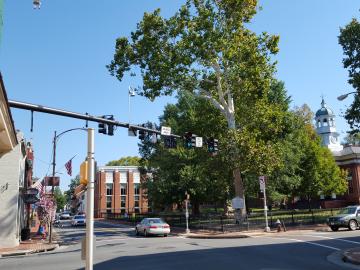
A modern, healthy transportation system is vital to the nation’s economic security and the American standard of living. The U.S. Department of Energy’s Oak Ridge National Laboratory (ORNL) is engaged in a broad portfolio of scientific research for improved mobility

Artificial intelligence (AI) techniques have the potential to support medical decision-making, from diagnosing diseases to prescribing treatments. But to prioritize patient safety, researchers and practitioners must first ensure such methods are accurate.

Materials scientists, electrical engineers, computer scientists, and other members of the neuromorphic computing community from industry, academia, and government agencies gathered in downtown Knoxville July 23–25 to talk about what comes next in
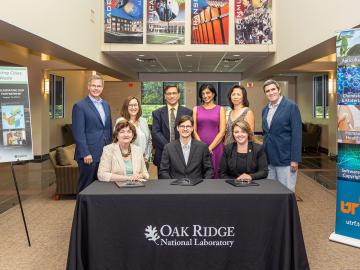
Electro-Active Technologies, Inc., of Knoxville, Tenn., has exclusively licensed two biorefinery technologies invented and patented by the startup’s co-founders while working at the Department of Energy’s Oak Ridge National Laboratory. The technologies work as a system that converts organic waste into renewable hydrogen gas for use as a biofuel.
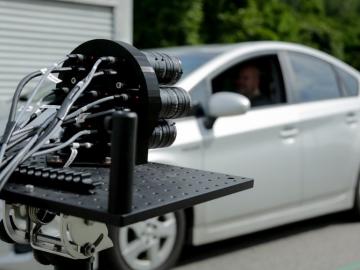
IDEMIA Identity & Security USA has licensed an advanced optical array developed at Oak Ridge National Laboratory. The portable technology can be used to help identify individuals in challenging outdoor conditions.
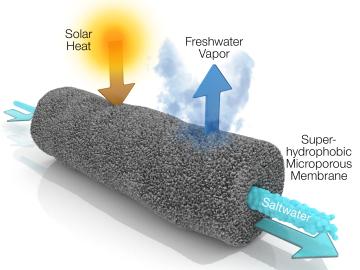
A new method developed at Oak Ridge National Laboratory improves the energy efficiency of a desalination process known as solar-thermal evaporation.
A team of scientists led by Oak Ridge National Laboratory have discovered the specific gene that controls an important symbiotic relationship between plants and soil fungi, and successfully facilitated the symbiosis in a plant that
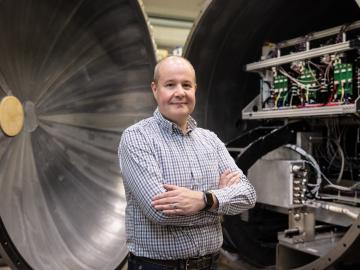
Sometimes solutions to the biggest problems can be found in the smallest details. The work of biochemist Alex Johs at Oak Ridge National Laboratory bears this out, as he focuses on understanding protein structures and molecular interactions to resolve complex global problems like the spread of mercury pollution in waterways and the food supply.
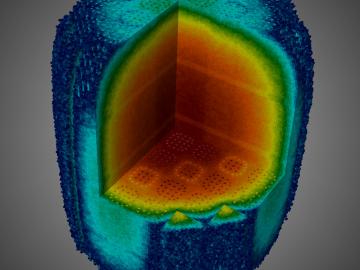
In a step toward advancing small modular nuclear reactor designs, scientists at Oak Ridge National Laboratory have run reactor simulations on ORNL supercomputer Summit with greater-than-expected computational efficiency.

Scientists at the Department of Energy’s Oak Ridge National Laboratory are working to understand both the complex nature of uranium and the various oxide forms it can take during processing steps that might occur throughout the nuclear fuel cycle.


